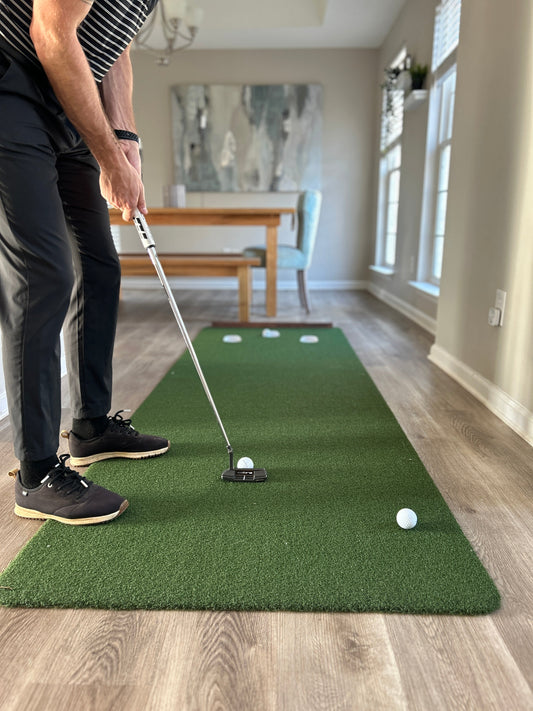I've spent almost three decades watching golfers of all levels struggle on the greens. The difference between shooting 85 and breaking 80 often comes down to just a few putts per round. After thousands of lessons, I've distilled great putting down to a simple four-step process that can transform your game.
Step One: Master Your Technique
Let's be honest—it doesn’t matter if you can read greens like Bryson DeChambeau if your putter face is flipping open at impact. Technique forms the foundation of everything else.
The most critical technical element? Face control through impact. Period.
I tell my students to invest in a quality putting mat for their homes. Not those cheap office putting toys. Get something with true roll characteristics. Fifteen minutes daily on a good mat will do more for their game than beating balls at the range.
When practicing, focus on keeping your hands ahead of the putter face through impact. This creates that beautiful top-spin roll that tracks true. Watch the pros on TV—notice how their hands never flip or break down through the hitting zone.
On your practice green, work with alignment sticks to ensure your eyes are positioned directly over the ball. This perspective is crucial for consistent path control.
Step Two: Become a Green Reader
I've had students who could stroke it beautifully on the practice green but couldn't read a children's book on the course. Reading greens isn't just about seeing break, it's about visualizing the perfect start line.
Here's what separates great putters from good ones: they don't aim at the hole. They aim at their start line, then find an intermediate target just inches in front of their ball that aligns with that start line.
Next time you're on the course, try this: before addressing the ball, stand behind it and visualize the entire journey your ball will take. Find a spot about 12-18 inches in front of your ball that sits on your intended start line. That spot becomes your actual target.
I've seen handicaps drop by three strokes just from this change alone.
As each green plays differently, check our post on adapting your putting technique for different conditions to learn how to tailor your reads and stroke accordingly.”
Step Three: Dial In Your Speed
You can read the perfect line, but if your speed is off, the ball won't drop. This is where my 10-foot calibration method comes in.
When you arrive at a course, head straight to the practice green. Find a flat section and pace off exactly ten feet. Make practice strokes with one goal: get the ball to roll precisely ten feet. Pay attention to how far back you're taking the putter.
What you're doing is creating a baseline stroke for the day's green speed. Once you know how far back to take the putter for a ten-foot roll, you've got a reference point for every putt you'll face.
I had a student—let's call him Mat—who three-putted six times in one round. After teaching him this method, he texted me after his very next round: "Only 29 putts today! Best putting round of my life!"
Step Four: Develop Your Pre-Stroke Routine
Watch Rory McIlroy or Jordan Spieth before they putt. Notice how they go through the exact same sequence every time? That's not a coincidence.
Your pre-stroke routine should include finding your line, identifying your intermediate target spot, and determining the stroke length necessary based on your 10-foot calibration.

Remember this crucial point about tempo: your putting stroke should always maintain a 2:1 ratio. The throughstroke should be twice as fast as the backstroke. This isn't just theory—it's what the best putters in the world do instinctively.
Bonus Step Five: Commit to Your Stroke
Commit completely to your stroke. Doubt is a killer on the greens. Once you've done your preparation, execute with absolute conviction. It doesn’t matter if you sink the putt or not. Commit to the process, evaluate the result, and learn from each stroke. Consistency will help you refine your putting and get better in the long run.
Persistent and extreme doubt in your stroke may be more than just the jitters. If you're panicking on the green, it's important to learn how to take control of your emotions in order to overcome the putting yips.
Ready to Improve Your Putting?
I've seen this four-step process transform weekend hackers into club champions. Give it an honest try for three rounds. Those few extra minutes of preparation might just save you five or six strokes per round. And in this game we love, that makes all the difference in the world.
Wanting some extra pointers? Consider integrating these effective putting drills to your practicing to improve your stroke.





